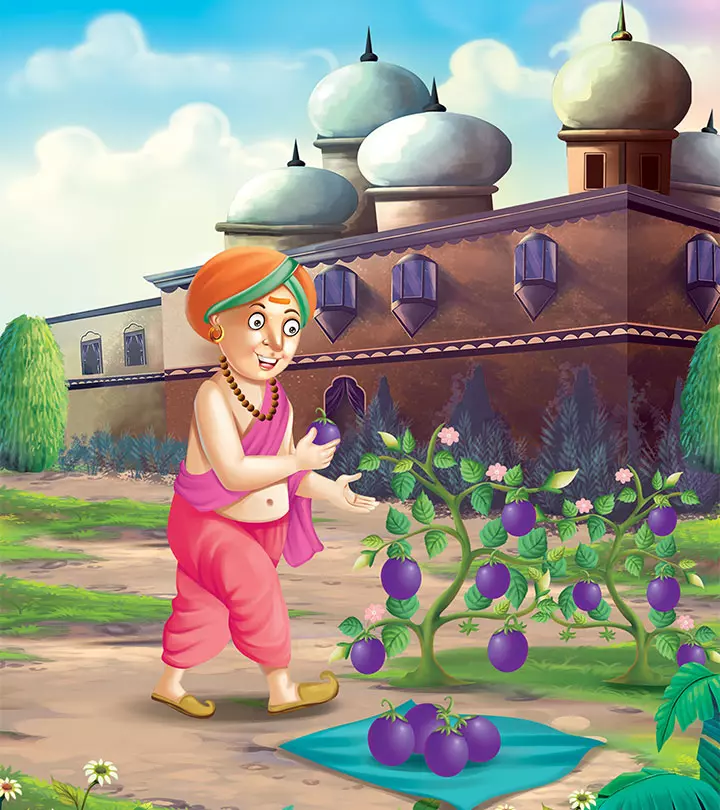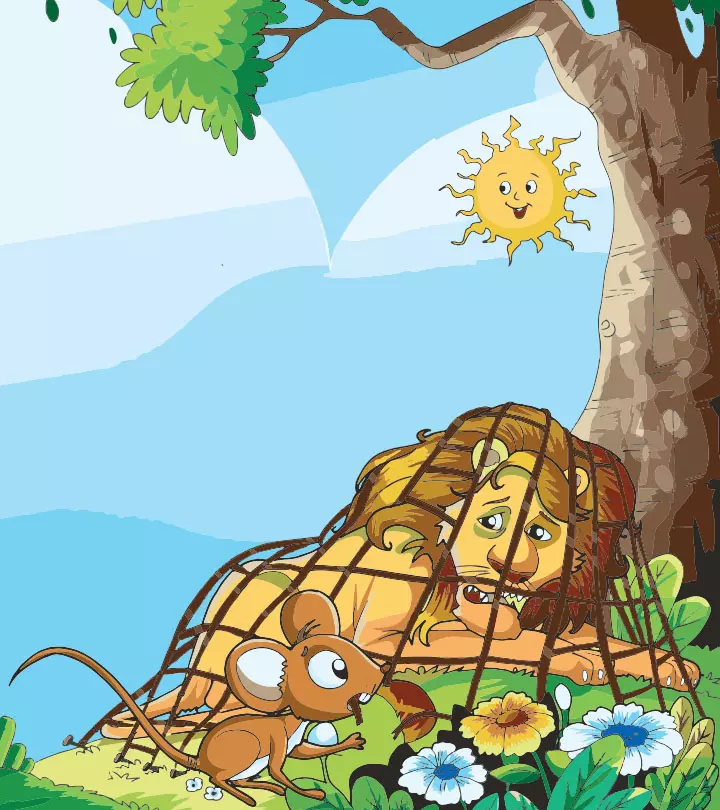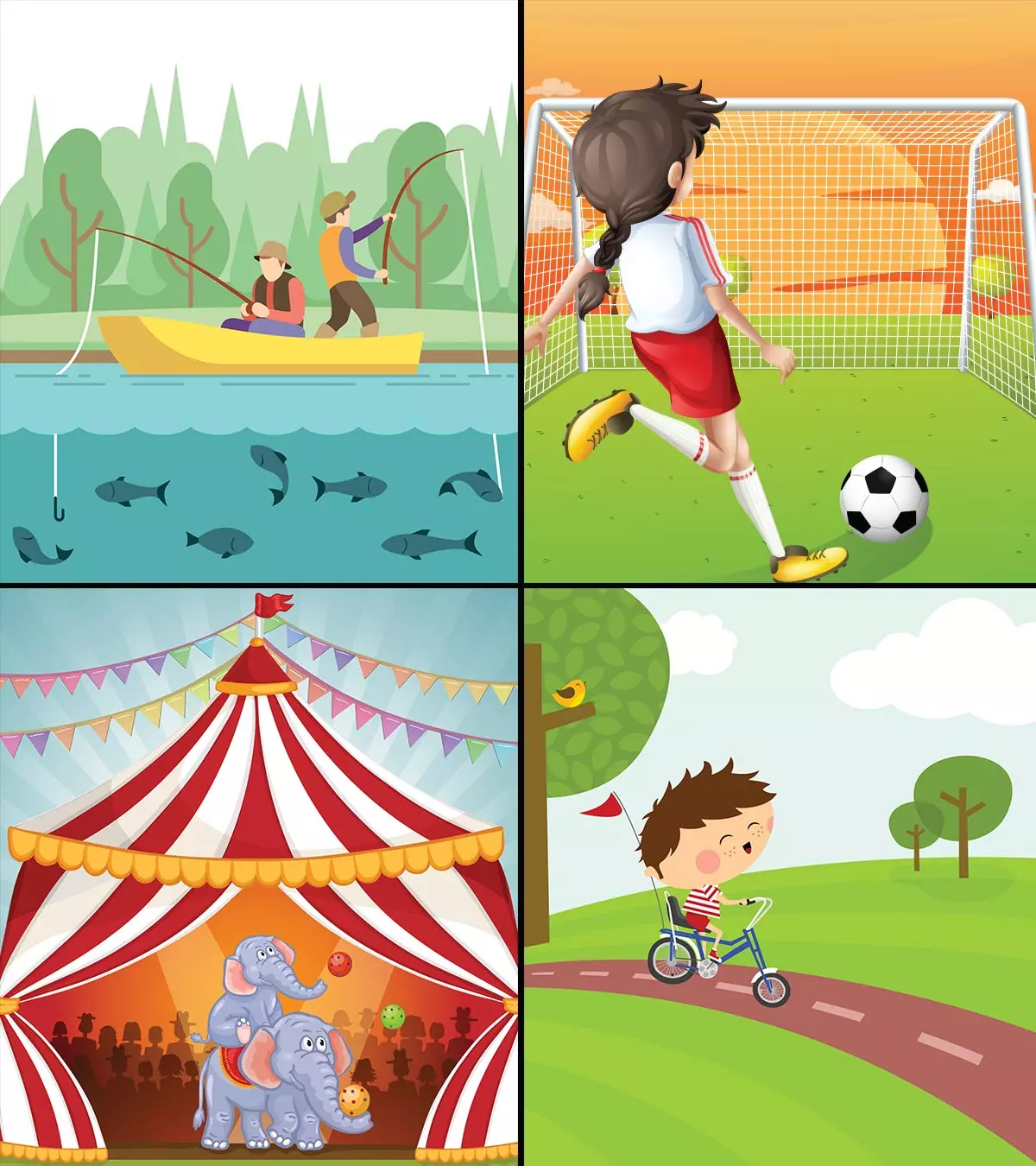
Image: ShutterStock
If your child loves oranges or orange-flavored foods, or if you want them to savor them more, here’s an interesting way to do so. We are here with some fun facts about oranges for children to help them develop an interest in the citrus fruitiFruits having a rough and thick texture on the outside and pulpy on inside . Oranges are rich in vitamin C, which is essential for a healthy body. They can be enjoyed fresh, juiced, or included in a variety of recipes, making them popular among children and parents. They are delicious, refreshing, and commonly found in local fruit grocers and supermarkets. We have included some recipes for you to try. So, read on to learn more. Also, you can try the quiz at the end.

Key Pointers
- Oranges are a safe and highly nutritious fruit for kids to consume regularly.
- They are rich in vitamin C and polyphenols which can boost children’s immunity and help prevent infections.
- Oranges are also a good source of calcium, iron, zinc, and phytonutrients, which promote healthy skin and mucous membranes in the eyes.
- Oranges are considered a remedy for anemia, dyspepsia, constipation, rickets, mumps, and typhoid infections.
- Freshly squeezed orange juice can be mixed with honey and salt to help alleviate cough and cold symptoms.
Is It Safe To Give Oranges To Kids?
Yes, your children can eat oranges regularly. Eating oranges for kids is not only safe, but is also highly nutritional and beneficial for their health. While choosing quality harvest oranges, make sure you choose firm, dense, and evenly-colored oranges for kids. Also, you can store fresh oranges in a fruit bowl for about two weeks. Refrigerate the oranges if you want to save them for longer.
12 Health Benefits Of Oranges For Kids
1. Boosts Immunity:

Oranges contain high amounts of vitamins and minerals which are highly beneficial for the growth, tissue and overall development, and health of kids. Just one fresh orange slice offers your child greater than 90% daily intake requirement of vitamin C, while the polyphenols help boost his immunity to keep infections and ailments at bay (1).
2. A Remedy For Anemia:
The Vitamin C content in the citrus fruit helps absorb iron, which increases hemoglobin count, and prevents the symptoms of anemia, such as fatigue and dizziness, in kids. Just serve your child a glass of fresh orange juice or a whole orange regularly to help him have a healthy hemoglobin count (2).
 Quick fact
Quick fact3. Cures Dyspepsia:
Dyspepsia is one of the common health concerns that most kids suffer since they have a weak and vulnerable digestive system. Drinking orange juice or eating fresh slices of oranges promotes smooth digestion and promotes an easy absorption of nutrients.
4. Treats Constipation:

Most foods that kids eat possess inadequate dietary fiber. As a result, your children suffer from constipation troubles. The consumption of oranges is one of the most effective solutions for preventing or treating constipation hazards as it comprises high amounts of dietary fiber i.e. 2.4 grams of fiber per 100 grams. You can serve your kid fruit salads containing slices of oranges to eliminate constipation problems (3).
5. A Remedy For Rickets:
Children are susceptible to rickets as their bones are weak and soft. Oranges are an excellent source of minerals, such as calcium, iron, zinc, manganese, magnesium, and copper, all of which help prevent the risk of the development of rickets in kids. Also, drinking orange juice every day is a great cure for symptoms of rickets and other disorders in children.
6. Reduces Cold And Cough Troubles:
Children often suffer irritation and weakness due to cold and cough. Oranges serve as one of the best remedies for minimizing these troubles. Also, medicinal properties of oranges protect your child from harmful secondary infections that come along with a cough and cold.
All you need to do is fill a cup with freshly extracted orange juice, add one teaspoon of honey and a pinch of salt to it, and serve it to your kid when he suffers from a cough or a cold.
7. Alleviates Mumps:
Mumps is a contagious viral disease, which quickly spreads among the children, particularly among the 5 to 15-year-olds. Providing your children fresh orange juice can help them get rid of the discomfort resulting due to mumps quickly. Make sure you dilute orange juice up to 50% and serve it to your affected kid with warm water.
8. Speeds Up Recovery From Typhoid Infection:
Typhoid occurs due to the growth of Salmonella typhiiA bacterial infection within the intestinal tract responsible for typhoid fever bacteria, which is a highly contagious microbe. Your kids suffer from a headache, chronic abdominal pain, and cough when they are down with thyroid. The infection also hampers the digestive power of children, and they can only have easily digestible liquids and foods. And, drinking fresh orange juice serves as one of the best remedies to speed up children’s recovery as it offers them all the lost nutrients.
9. Improves Vision:
Oranges are a rich source of vitamin A, flavonoidsiA group of naturally-occurring antioxidant and anti-inflammatory compounds found in plants and fruits , phytonutrientsiBioactive compounds found in plant-based foods that act as antioxidants and have antimicrobial effects , such as alpha and beta carotenes, lutein, beta-cryptoxanthiniA naturally occurring carotenoid pigment found in fruits and vegetables , and nutrients that help maintain healthy skin and mucous membrane of your kid’s eye. The consumption of citric acid also enhances your child’s vision and eye health significantly (4).
10. Offers Relief From Whooping Cough:
Whooping cough is a highly contagious and weakening health problem that can affect your kid’s health adversely. Orange juice is an excellent remedy for treating pain due to a cough. Provide your child fresh, diluted orange juice as well as place wet packs on his chest and throat to help him have quick relief from the symptoms of whooping cough.
11. Curbs Gum Bleeding And Tooth Loss:

Vitamin C plays a vital role in the production of collagen in your kid’s body. Collagen is a crucial element of bones, tendons, blood vessels, and ligaments. A deficiency of vitamin C can make your child suffer from symptoms of scurvyiA condition caused by the lack of vitamin C and is characterized by swollen and bleeding gums , such as gum bleeding, tooth loss, acute pain in the joints, and easy bruising. Give your kids fresh orange slices, as they serve as a natural and effective solution for eliminating the symptoms and hazards of scurvy (5).
12. Eliminates Diarrhea:
Severe diarrhea can prove hazardous for your kid’s health. Giving kids fresh orange juice regularly can help alleviate the symptoms of diarrhea substantially. Dilute freshly extracted orange juice with water up to 50% and provide it to your kid to help him obtain great relief from the digestive disorders.
 Be watchful
Be watchfulNutritional Values Of Vital Nutrients In Oranges
Here, we list the nutritional value of all crucial nutrients in oranges per 100 grams.
| Nutrients | Nutrient Value | Percentage RDA |
|---|---|---|
| Energy | 47 Kcal | 2.50% |
| Dietary Fiber | 2.4 grams | 6.00% |
| Riboflavin | 0.040 mg | 3.00% |
| Thiamin | 0.100 mg | 8.00% |
| Vitamin A | 225 IU | 7.50% |
| Vitamin C | 53.2 mg | 90.00% |
| Vitamin E | 0.18 mg | 1.00% |
| Potassium | 169 mg | 3.50% |
| Calcium | 40 mg | 4.00% |
| Iron | 0.10 mg | 1.00% |
| Magnesium | 10 mg | 2.50% |
| Zinc | 0.08 mg | 1.00% |
| Copper | 39 µg | 4.00% |
| Beta-carotene | 71 µg | – |
| Alpha-carotene | 11 µg | – |
| Beta-cryptoxanthin | 116 µg | – |
Adding oranges to your child’s diet can provide a substantial amount of their daily vitamins and nutrients, aiding in their overall growth and development.
How To Choose And Serve Quality Oranges For Kids In A Healthy Way?
To help your child enjoy eating a fresh orange without any hassles, you need to follow certain tips that will ensure your child enjoy quality fruit safely.
- Choose Sweet Oranges Only: Make sure you provide your kids only sweet oranges as they are better tasting than sour oranges.
- Get A Firm Orange: Ensure that the orange is ripe. Examine all the sides of the fruit from all directions. If you come across any soft spots, then avoid that orange.
- Remove Peels, Fiber, And Seeds: Choose an orange that is easy to peel. Remove the fibers which surround the orange’s flesh. Also, remove all tiny seeds within the orange so that your kid has trouble-free experience while eating oranges.
- Mash The Orange: If your child finds it difficult to eat orange segments, then you can mash the flesh and make it easy for your them to eat the fruit.
- Do not give kids orange juice on an empty stomach as the citric acid content in the drink can make them suffer from acidity.
 Point to consider
Point to consider- Use straw to drink the orange juice, as the acids in the juice can harm your kid’s tooth enamel and erode it.
11 Fun Facts And Information On Oranges For Kids
1. What Is An Orange?
Orange is a widely popular citrus fruit native to Southeast Asia, and it belongs to the family of RutaceaeiA family of plants with strong-smelling foliage . The word ‘Orange’ comes from the Sanskrit word ‘naranga’, which means fragrant. It is a hybrid of pomelo and mandarin, and its cultivation dates back somewhere around in 2500 BC. Today, you can find greater than 600 varieties of orange trees worldwide. In addition to this, oranges not only are nutritious for kids but also have applications in perfumes and cosmetics industry.
2. What Do Oranges Signify?
Orange blossoms and oranges stand as the symbol of love. Oranges are also known as the fruits of the Gods, and many people call them ‘Golden apples’ that Hercules stole.
3. How Do Oranges Grow?
Oranges grow on trees that can thrive for many years. The growth process starts with small flowers that develop into green fruit. As the fruit matures, it turns from green to orange. Oranges are usually harvested during the winter and spring.
4. Different Varieties Of Oranges:
People classify oranges into three broad categories, namely sweet, sour, and loose-skinned. Find them below.
- Citrus Sinensis (Sweet): Usually, you use this type of oranges for preparing juices, tarts, salads, and other delicious food preparations. Navel oranges, Blood oranges, and Valencia orange are common among the sweet variety of the fruit.
- Citrus Aurantium (Sour): Being bitter to taste, people seldom eat sour oranges. Large cultivations of the bitter citrus fruit are present in South Africa for the production of marmalade. People use the juice of sour oranges as a flavoring agent to prepare wine and cook fish in Egypt.
- Citrus Reticulata (Loose-Skinned): Oranges belonging to Mandarin family are loose-skinned fruits. They are small in size and easy to peel. Clementine and tangerines are popular oranges of this category.
5. Which Country Is The Largest Producer Of Oranges?
- Brazil is famous as the largest producer of nutritious oranges, and Florida is the second-largest producer of oranges. About 50% of the global orange concentration comes from Brazil.
- Orange groves are also widely present in Spain, with more than 35 million orange trees.
- Also, you can find cultivations of Blood orange in Italy, Jaffa in Israel, and Clementine orange in Morocco.
6. Orange agriculture is renowned for being the largest citrus crop in the world.
7. How Did Oranges Come To the USA?
Christopher Columbus was the first person to bring orange seedlings and seeds to the USA in 1493.
8. How Popular Is White Orange Blossom?
- White Orange Blossom has the fame for being the state flower of Florida.
- It has a great fragrance, so people use it in the wedding for bridal bouquets, cake decorations, and head wreaths.
- The essence of the White Orange Blossom is a vital element for the production of perfumes, and its petals are essential to prepare orange water. It is a unique variety of orange with great import-export value.
9. How Orange Peels Are Useful:
Orange peels’ zest is good to garnish salads and other food items as it brings the flavor. Chemicals in the orange’s peel repel pests like slugs substantially. So, lots of people use the peels of oranges as natural pesticides in their gardens to protect their plants from pests.
10. You can use the sticks made by using orange wood for manicure and pedicure treatments.
11. What Is The Average Lifespan Of An Orange Tree?
An orange tree can live up to 50 years, provided it receives suitable climatic and environmental conditions.
4 Orange Recipes For Kids
Oranges possess the potential to replace all kinds of sweet, tangy, and processed foods that your children usually crave for eating now and then. The sweet-tart taste and high nutritional content make the oranges a delicious, healthy option to enhance various food preparations and replace processed foods. Here, we list four delicious oranges recipes for kids.
1. Orange Peach Smoothie For Kids:
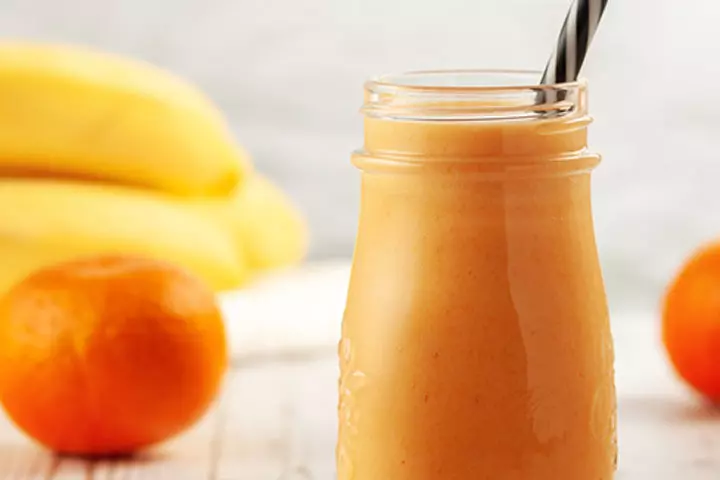
Smoothies are healthier than processed foods and beverages like dessert and soda drinks.
You Will Need:
- ½ cup of freshly extracted orange juice
- Water
- One peeled, chopped peaches of peach
- ½ cup of yogurt
How To:
- Mix a half cup of orange juice, small pieces of peach, half cup of yogurt and blend them in a blender.
- Add some water to the mixture and mix again in the blender until it turns smooth.
- Refrigerate and serve chilled orange smoothie to kids.
2. Orange Ice Cream Pops For Kids:
You Will Need:
- Two full cups of vanilla ice cream
- A cup filled with cold milk
- Six to eight ounces of freshly extracted orange juice
- Plastic cups
How To:
- Mix vanilla ice cream, milk, and fresh orange juice in a blender and blend it till it turns smooth.
- Pour a half cup of smooth mixture in each plastic cup and deep fridge them till they turn solid.
This is a great recipe for children during the summer season.
3. Orange And Grapes Fruit Salad For Kids:
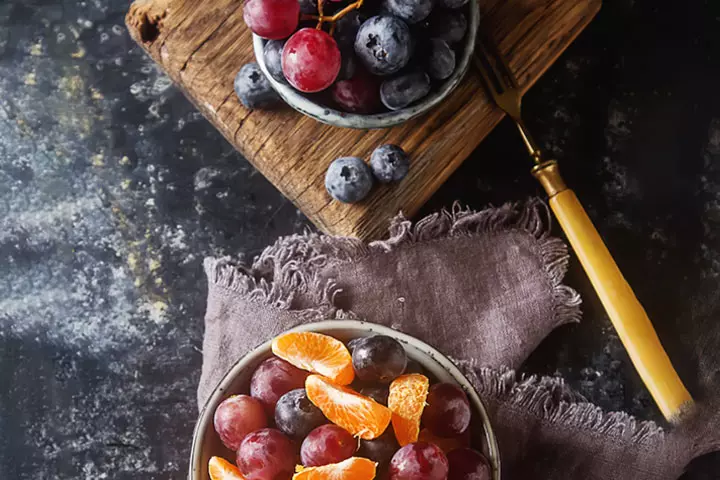
You Will Need:
- Fresh, chopped slices of an orange
- Handful of grapes
- Orange juice
- Chopped nuts, such as almond, pistachio, cashew nuts, and other nuts
- Vanilla ice cream
How To:
- Mix grapes, freshly chopped oranges, and vanilla ice cream in a bowl and mix all the ingredients well.
- Garnish the fruit salad with pieces of almonds, cashews, and pistachio for better taste.
4. Orange Yogurt Parfait:
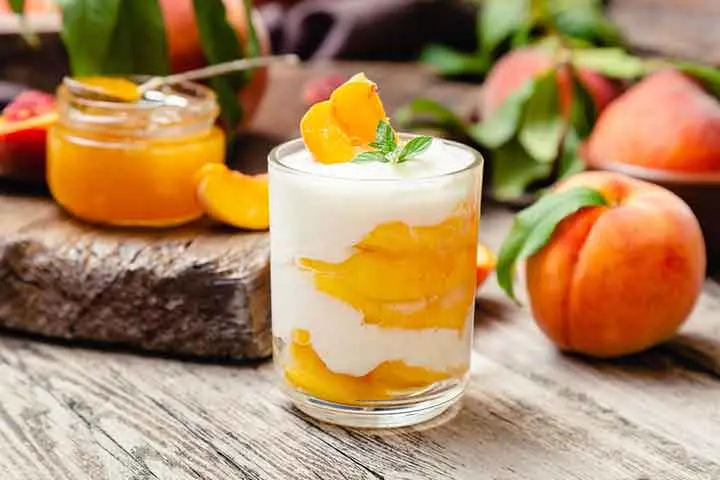
You Will Need:
- 3 oranges
- 1 cup plain greek yogurt
- ¼ cup granola
- 1tsp maple syrup
How To:
- Peel one orange, separate the sections, and chop them into small pieces.
- Slice the other two oranges in half and juice them to yield about 1/4 cup.
- In a bowl, mix the juice, yogurt, and maple syrup, then stir in the granola.
- Divide the yogurt into two bowls and top with the chopped orange.
Did you share these interesting, fun facts, benefits, and recipes of oranges with your kids? Which facts did your children like the most? Tell us. Leave a comment below.
1. Which one of the following is not a use of orange?
2. Which one of the following components does not improve vision?
3. Choose the incorrect option.
Key: 1. B 2. B 3. A
Frequently Asked Questions
1. At what age can my child eat oranges?
Babies can consume most pureed fruits in small quantities from around six months (6). Since oranges are high in citric acid, your doctor may recommend waiting longer before introducing them to your little one’s diet. Hence, consult your pediatrician to confirm whether your baby is ready to eat oranges.
2. When can babies have mandarin oranges?
The level of citric acid in mandarin oranges may be less than in navel oranges. However, to avoid complications, check with your pediatrician before you consider oranges for babies.
3. Can I eat the peel of an orange?
You can eat a peel of orange as it is edible, but not a good idea because it is bitter to taste and has a rough texture. If you wish to consume its peel, you can use it as orange zest, which is the outer layer of the peel, grated and used to add flavor to dishes. However, do not forget to wash it thoroughly before grating it.
4. What is the difference between a tangerine and an orange?
Tangerines may look like oranges but are relatively smaller and have a brighter orange hue. They are easier to peel, unlike oranges, which have tough skin. Tangerines are sweeter, juicier, and tangy, unlike oranges, which have a balanced sweet-tart taste.
5. Can I grow oranges in my backyard?
Oranges grow in warm subtropical or tropical regions. They need full sun, well-drained soil, and regular watering. If you live in a similar climate, your backyard has good soil, and you are patient enough, you can grow oranges in your backyard.
6. Can oranges help keep children hydrated?
Oranges are rich in water and can help keep kids hydrated, particularly during the warmer months.
Children may find it interesting when you share some facts about oranges. The fruit has been an essential part of the food diet of many cultures and folklores in history. Oranges can satisfy a significant part of children’s daily vitamin C requirements. Vitamin C promotes iron absorption and reduces the risk of iron-deficient anemia. They also boost the immune system and keep infections away. You may choose sweet oranges for children since they may not like the sour taste. Further, eat fresh oranges to get dietary fibers and go for homemade pressed juices for kids since most commercial juices contain extra sugar and preservatives.
Infographic: How To Pick The Best Oranges?
Oranges are loaded with antioxidants and nutrients. They are good for keeping your child hydrated and energized, making them an ideal snack option. While buying oranges, remember that firm and heavy ones are generally fresher and juicier than those that are soft or lightweight. Here are some easy tips on how to buy the best oranges for your adorable little one.
Some thing wrong with infographic shortcode. please verify shortcode syntax
Illustration: Health Benefits And 10 Facts About Oranges For Kids

Image: Stable Diffusion/MomJunction Design Team
References
- Exercise and eating healthy.
https://www.usa.gov/education?source=kids - Anemia: Iron Deficiency.
https://www.nationwidechildrens.org/conditions/anemia-iron-deficiency - Nutrition For Health And Fitness: Fiber In Your Diet.
https://edis.ifas.ufl.edu/publication/he697 - Vitamin A Fact Sheet for Consumers.
https://ods.od.nih.gov/factsheets/VitaminA-Consumer/ - Anil Agarwal, et al.; Scurvy in pediatric age group – A disease often forgotten?
https://www.ncbi.nlm.nih.gov/pmc/articles/PMC4411344/ - Fruit and vegetables for children.
https://www.pregnancybirthbaby.org.au/five-food-groups - How much iron do kids need?
https://kidshealth.org/en/parents/iron.html - Chronic Diarrhea in Children (NDDIC)
https://www.niddk.nih.gov/-/media/Files/Digestive-Diseases/Chronic_Diarrhea_in_Children_508.pdf - Vitamin C (Ascorbic acid)
https://www.mountsinai.org/health-library/supplement/vitamin-c-ascorbic-acid - Stomach damage if drinking orange juice on an empty stomach
https://www.vinmec.com/en/news/health-news/healthy-lifestyle/stomach-damage-if-drinking-orange-juice-on-an-empty-stomach/#:~:text=The%20amount%20of%20protein%20in,indigestion%2C%20diarrhea%20or%20abdominal%20pain
Community Experiences
Join the conversation and become a part of our nurturing community! Share your stories, experiences, and insights to connect with fellow parents.
Read full bio of Jennifer House
Read full bio of Kavita Kankani
Read full bio of Swati Patwal
Read full bio of Shinta Liz Sunny














